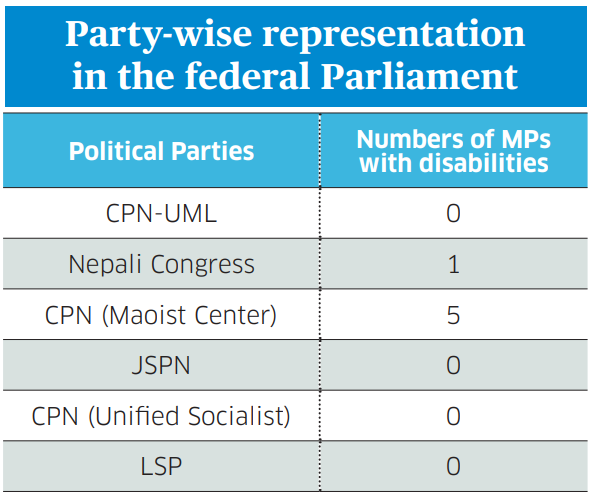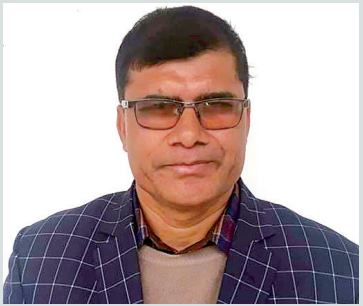Article 29 of the United Nations Convention on the Rights of Persons with Disabilities (UNCRPD) says, “State parties shall guarantee to persons with disabilities, political and public rights and the opportunity to enjoy them on an equal basis with others.”
Around 15 years after the convention’s drafting, the entire world has lately taken a stand in favor of proportional inclusion and representation for the population with disabilities. Nepal is one of the laggards.
According to the 2011 census, around 1.94 percent of Nepal’s population lives with some form of disability. The preamble of the Constitution of Nepal 2015 talks of building “… an egalitarian society founded on the proportional inclusive and participatory principles to ensure economic equality …” This means, in each sector, two percent of the seats are to be set aside for the persons with disabilities (PWDs).
But have we adhered to the provisions of our constitution and international treaties?
As politics lies at the center of everything, it is worth asking how inclusive this field is when it comes to the PWDs. Not very much, unfortunately.
In the federal parliament of Nepal, of 275 MPs, only two are with disabilities, both from the CPN (Maoist Center). The Maoists have thus provided relatively more seats to the people living with disabilities, but they also consider those injured in the armed rebellion as PWDs. Chudamani Khadka, an MP with a disability due to a bullet injury he sustained during the insurgency, is a long-time personal aide to chairman Pushpa Kamal Dahal.
Teknath Neupane, former chairman of Apangata Sangathan Nepal, a Maoist PWD sister organization, accepts that the party has given more priority to those who sustained injuries during the conflict over those born with disabilities. Injured cadres from the armed revolution who were ready to sacrifice their lives for the party deserve the attention, he says. But, he adds, “They have now gained enough recognition and time has come to start treating all those with disabilities with the same yardsticks.”
Party spokesperson Narayan Kaji Shrestha accepts that those who got disabilities during the conflict climbed the ladder of political leadership faster compared to other PWDs.
A recent standing committee decision, before the party’s national conference, made it mandatory for party units to select at least one person with disability as a delegate to the convention from each local level. “We are strengthening the party from the base-up and ultimately, each will find his or her rightful place in leadership,” Shrestha promises.
In the National Assembly, there are four PWDs—one from Nepali Congress and three from Maoists. Similarly, the seven provincial parliaments, in total, have no more than a PWDs, all from Congress and Maoists. CPN-UML and other parties don’t have a single such provincial lawmaker.
“There are 15 MPs who qualify as PWDs in the country. This number should have been enough to raise our issues in parliaments, but regretfully, only few of them consider themselves PWDs,” says Bhojraj Shrestha, chairman of Rastriya Loktantrik Apanga Sangh, the Nepali Congress sister wing for the person with disabilities.
Shrestha, along with 22 other members, had formed the organization back in 2006, but the party officially recognized it only in 2009.
Says Jagadish Prasad Adhikari, general secretary of Loktantrik Rastriya Apanga Sangathan, a CPN-UML sister organization, who also was a convention representative at the 10th UML General Convention, “My party has neither addressed our issues nor given us a seat on party committees.”
Also read: Nepal struggling to deal with new refugees
During the latest UML general convention, not a single person with disability won a party-leadership position. Of the 12 PWD delegates, five were from the quota of the sister wings. “We didn’t contest as the party asked us for consensus and we respected the policy, but later, we got scammed,” he says.
Newly elected UML Secretary Yogesh Bhattarai says there was no restriction to contest elections. For him, inclusion is a new concept, and it takes time to adapt. “We are discussing separate seats for the person with disabilities in the party’s committees,” he adds. But UML recently published the nominated list of 30 members in the central committee and again, not a single party person with a disability got the nomination. According to Bhattarai, the party is still working to include them besides the central committee.
As the Maoist national conference is around the corner, cadres of its PWD wing are hopeful of more representation in the party. “Our party has shown the way, it’s time to see how they implement the policies,” says Neupane.
Because of poor management, Nepali Congress hasn’t been able to hold its 16 district conventions, barring many deserving party members from filing candidacies. The same happened with Shrestha of the NC sister wing, as he didn’t get to contest for the posts. “Of the six people with disability who are contesting for a seat in the central committee, almost none consider themselves a PWD or part of the disability movement,” he adds with disappointment. “But I am sure they are the ones who will win.”
Debu Parajuli was told by the Rastriya Prajatantra Party that they have no quota for the PWDs. She then filed her candidacy for central committee member from the open category, getting the sixth most votes.
“People with disabilities can stand toe to toe with anyone,” she says. “Quotas are necessary but if you don’t fit into them, please enter the contest from the open category. That I won means that I defeated an ‘able’ person,” Parajuli says.
The other problem is that political parties’ leaderships still don’t deem the person with disabilities good enough for important party posts. Moreover, the PWD quotas are often misused.
Mitra Lal Sharma
President, National Federation of the Disabled-Nepal (NFDN)
Our presence in decision-making is a must
I find it pathetic when people think that our needs and aspirations should be confined to getting wheelchairs and other disability-friendly infrastructure. We are not given leadership positions even when we have the requisite knowledge and skills.
Let’s compete. This is an open challenge to the leaders of mainstream political parties. If the people/team you carry can defeat us with your knowledge, ideology and skills, we are fine with not being included, but what if we win? They need our vote and tax, but not our knowledge. Let me ask our political leaders: What is the required qualification to lead a major political party?
When there is a lack of our participation in policymaking, the problems of the people with disability can’t be addressed as other people do not know about our issues and even if they do, they often don’t bother to speak about them. So our presence in decision-making is a must.















